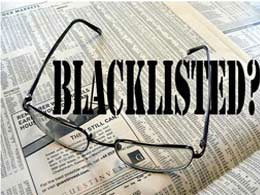 New Delhi, Mar 10: Adopting a name and shame policy to make borrowers pay their dues, banks have decided to publish in newspapers photographs and details like names and addresses of wilful loan defaulters and market leader SBI has taken the lead in doing so.
New Delhi, Mar 10: Adopting a name and shame policy to make borrowers pay their dues, banks have decided to publish in newspapers photographs and details like names and addresses of wilful loan defaulters and market leader SBI has taken the lead in doing so.
Besides, banks would also publish photographs, names and addresses of guarantors of such defaulters in newspapers if the dues are not cleared within 15 days of the notice containing particulars of the original borrowers.
Some banks have also decided to prominently display the photographs and other details of the wilful loan defaulters at branches in the locality of such borrowers, a senior executive with a leading bank said.
Taking the lead, State Bank of India has begun publishing photographs and other particulars of such defaulters and has published one such public notice in newspapers for five defaulters in the national capital.
These persons had taken export credit loans of Rs. three lakh each and their outstanding amounts were in the range of Rs. 2.6 lakh to Rs. 2.93 lakh.
Executives at many other banks said that they would also publish the photographs and other details of their wilful defaulters in local newspapers circulated in areas of residence of such persons.
As per RBI's regulations, wilful defaulters are mostly those who are found to be engaged in deliberate non-payment of dues despite adequate cash flow and good networth.
Besides, banks can also classify defaulters as 'wilful' if the loans are utilised for purposes other than those previously stated, funds are siphoned off from the bank-financed activity, records are falsified, securities are disposed of without bank's knowledge and the borrower indulges in fraudulent transactions.
RBI has already put in place a system to disseminate credit information pertaining to wilful defaulters for
cautioning banks and financial institutions, so that any further bank finance is not made available to such borrowers.
Now, banks have decided to make public the photographs and other details of wilful loan defaulters through newspaper notices, so that such borrowers clear their dues. Besides, banks also expect such notices to act as a deterrent for others against any loan defaults.
In one such notice, SBI said that names and photographs of the guarantors of those defaulters would be published in newspapers if these borrowers do not clear their dues within 15 days of the publication of notice.
The bank also warned other defaulters that "their photograph may be the next to be published after completion of necessary formalities, if the dues are not cleared immediately".
RBI has also asked Credit Information Bureau India Ltd (CIBIL) to publish a list of wilful defaulters involving defaults of Rs. 25 lakh and above.




Comments
Add new comment